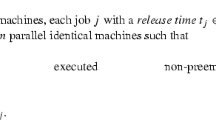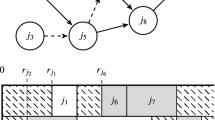Abstract
We consider the problem of finding near-optimal solutions for a variety of NP-hard scheduling problems for which the objective is to minimize the total weighted completion time. Recent work has led to the development of several techniques that yield constant worst-case bounds in a number of settings. We continue this line of research by providing improved performance guarantees for several of the most basic scheduling models, and by giving the first constant performance guarantee for a number of more realistically constrained scheduling problems. For example, we give an improved performance guarantee for minimizing the total weighted completion time subject to release dates on a single machine, and subject to release dates and/or precedence constraints on identical parallel machines. We also give improved bounds on the power of preemption in scheduling jobs with release dates on parallel machines.
We give improved on-line algorithms for many more realistic scheduling models, including environments with parallelizable jobs, jobs contending for shared resources, tree precedence-constrained jobs, as well as shop scheduling models. In several of these cases, we give the first constant performance guarantee achieved on-line. Finally, one of the consequences of our work is the surprising structural property that there are schedules that simultaneously approximate the optimal makespan and the optimal weighted completion time to within small constants. Not only do such schedules exist, but we can find approximations to them with an on-line algorithm.
Supported partly by ARPA/DOD (DABT63-92-C-0026), DOE (DE-FG03-94ER25206), and NSF (CCR-9210260, CDA-8722788 and CDA-9401156). Part of the work was done while visiting IBM T. J. Watson Research Center.
This work was performed under U.S. Department of Energy contract number DE-AC04-76AL85000.
Supported by the graduate school Algorithmische Diskrete Mathematik (DFG), grant We 1265/2-1.
Research partially supported by NSF grant CCR-9307391.
Research partially supported by NSF Award CCR-9308701, a Walter Burke Research Initiation Award and a Dartmouth College Research Initiation Award.
Research partially supported by NSF Research Initiation Award CCR-9211494 and a grant from the New York State Science and Technology Foundation, through its Center for Advanced Technology in Telecommunications.
Preview
Unable to display preview. Download preview PDF.
Similar content being viewed by others
References
D. Applegate and W. Cook. A computational study of the job-shop scheduling problem. ORSA Journal of Computing, 3:149–156, 1991.
I. Bárány and T. Fiala. Többgépes ütemezési problémák közel optimális megoldása. Szigma-Mat.-Kozgazdasági Folyóirat, 15:177–191, 1982.
A. Blum, P. Chalasani, D. Coppersmith, B. Pulleyblank, P. Raghavan, and M. Sudan. The minimum latency problem. In STOC 26, pages 163–172, 1994.
J.L. Bruno, E.G. Coffman, and R. Sethi. Scheduling independent tasks to reduce mean finishing time. Communications of the ACM, 17:382–387, 1974.
S. Chakrabarti and S. Muthukrishnan. Resource scheduling for parallel database and scientific applications. To appear in SPAA 96, June 1996.
A. Feldmann, M. Kao, J. Sgall, and S. Teng. Optimal online scheduline of parallel jobs with dependencies. In STOC 25, pages 642–653, 1993.
M.R. Garey and R.L. Graham. Bounds for multiprocessor scheduling with resource constraints. SIAM Journal on Computing, 4:187–200, 1975.
M. Goemans and J. Kleinberg. An improved approximation ratio for the minimum latency problem. In SODA 7, pages 152–157, 1996.
T. Gonzalez and S. Sahni. Open shop scheduling to minimize finish time. Journal of the ACM, 23:665–679, 1976.
L.A. Hall, A.S. Schulz, D.B. Shmoys, and J. Wein. Scheduling to minimize average completion time: Off-line and on-line algorithms. Joint journal version of [11] and [18]; in preparation.
L.A. Hall, D.B. Shmoys, and J. Wein. Scheduling to minimize average completion time: Off-line and on-line algorithms. In SODA 7, pages 142–151, 1996.
W. Horn. Minimizing average flow time with parallel machines. Operations Research, 21:846–847, 1973.
C.A.J. Hurkens and M.J. Coster. On the makespan of a schedule minimizing total completion time for unrelated parallel machines. Unpublished manuscript.
D.S. Johnson and K.A. Niemi. On knapsacks, partitions, and a new dynamic programming technique for trees. Mathematics of Operations Research, 8:1–14, 1983.
W. Ludwig and P. Tiwari. Scheduling malleable and nonmalleable parallel tasks. in SODA 5, pages 167–176, 1994.
C. Phillips, C. Stein, and J. Wein. Scheduling jobs that arrive over time. In WADS 4, pages 86–97, 1995.
M. Queyranne and A.S. Schulz. Polyhedral approaches to machine scheduling. Preprint 408/1994, Dept. of Mathematics, Technical University of Berlin, 1994.
A.S. Schulz. Scheduling to minimize total weighted completion time: Performance guarantees of LP-based heuristics and lower bounds. Preprint 474/1995, Dept. of Mathematics, Technical University of Berlin. To appear in IPCO V, June 1996.
D.B. Shmoys, C. Stein, and J. Wein. Improved approximation algorithms for shop scheduling problems. SIAM Journal on Computing, 23:617–632, 1994.
D.B. Shmoys and É. Tardos. Scheduling parallel machines with costs. In SODA 4, pages 448–455, 1993.
W.E. Smith. Various optimizers for single-stage production. Naval Research Logistics Quarterly, 3:59–66, 1956.
J. Turek, U. Schwiegelshohn, J. Wolf, and P. Yu. Scheduling parallel tasks to minimize average response time. In SODA 5, pages 112–121, 1994.
Author information
Authors and Affiliations
Editor information
Rights and permissions
Copyright information
© 1996 Springer-Verlag Berlin Heidelberg
About this paper
Cite this paper
Chakrabarti, S., Phillips, C.A., Schulz, A.S., Shmoys, D.B., Stein, C., Wein, J. (1996). Improved scheduling algorithms for minsum criteria. In: Meyer, F., Monien, B. (eds) Automata, Languages and Programming. ICALP 1996. Lecture Notes in Computer Science, vol 1099. Springer, Berlin, Heidelberg. https://doi.org/10.1007/3-540-61440-0_166
Download citation
DOI: https://doi.org/10.1007/3-540-61440-0_166
Published:
Publisher Name: Springer, Berlin, Heidelberg
Print ISBN: 978-3-540-61440-1
Online ISBN: 978-3-540-68580-7
eBook Packages: Springer Book Archive




